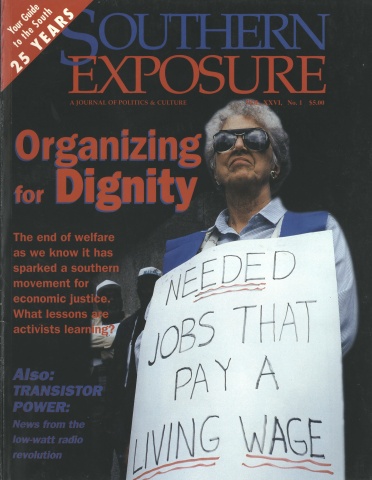Ahoy! Pirates

This article originally appeared in Southern Exposure Vol. 26 No. 1, "Organizing for Dignity." Find more from that issue here.
Have you heard of Teach the Rover,
And his Knavery on the Main;
How of Gold he was a Lover,
How he lov’d all ill got Gain.
— From a song printed in the New England Magazine, June, 1898.
Edward Teach, better known as Blackbeard, was one of dozens of pirates who raided merchant vessels along the Atlantic coast in the early 1700s. While hundreds of crews from European ports raided and pilfered the Americas in the name of their countries, Blackbeard and his pirate compatriots claimed the booty for themselves.
Blackbeard, an educated Englishman, was one of the South’s most notorious pirates. He roamed the southern seacoast searching for ships to raid, sticking smoking matches in his thick dark hair and beard and knifes and pistols in his clothing to produce a devilish aura. One of his most notorious attacks was on the port of Charleston, South Carolina, where he and his crew blockaded the city for a week, capturing several merchant ships, holding hostage a member of the governor’s council, robbing gentry in the streets and stealing medicines to keep on board his ship.
North Carolina was his home, however, and he had hideouts in the town of Bath and one on Ocracoke Island. The colony’s governor, Charles Eden, is believed to have had a friendly relationship with Blackbeard and turned a blind eye to his exploits, perhaps even sharing in the ill-gotten gains. When North Carolina residents could no longer endure his pillaging, they asked Gov. Alexander Spotswood of Virginia to intercede. The legendary pirate was beheaded in the ensuing battle with British military ships. His death in 1718 was said to have brought an end to the age of piracy.
Piracy also provided an exciting alternative career for adventurous women who didn’t fit into the mold of 18th century womanhood. Mary Read posed as a man and fought with the British Army and Royal Navy before she joined Calico Jack Rackman’s pirate ship. Read’s compatriot, Anne Bonny, escaped an unhappy marriage to ally with Rackman. Both were captured and sentenced to hang, but Read died in jail and Bonny is believed to have been ransomed back to her home in the Carolinas by her father.
Pirates of old are still causing scandals today. Plans for a pirate museum in Tampa were scrapped when financial backers became wary of racial issues surrounding the artifacts. The artifacts’ origin was a 18th century ship designed to carry slaves that was later captured by pirates. Opponents of the museum were concerned that the story of slavery would not be given adequate treatment; by the time a bi-racial committee had formed to address the issue, the financiers had pulled out.
Shipwrecks were as common as pirates along the southern coastline, where the shifting sand of off-shore islands such as North Carolina’s Outer Banks stranded thousands of vessels. Nearly 300 years after Blackbeard ran aground in Beaufort Inlet, a private company called Intersal, Inc. discovered what is believed to be his ship, the Queen Anne’s Revenge. “We’re 95 percent sure it’s Blackbeard’s ship,” says Joanne Powell. Working in cooperation with the N.C. Division of Archives, Intersal set up a nonprofit organization to verify the identity of the ship and recover its artifacts. Several, including a bell, blunderbuss barrel and cannonballs, are already on display in the museum.
There are new styles of pirates today who don’t have to risk their lives on the high seas; they can operate from the comfort of their own home or office. Software pirates pull their booty off computer disks, copying programs illegally. Phone pirates use special equipment to steal cellular phone numbers and make illegal calls. Investigators in San Antonio cracked down on video pirates who produced more than 600 counterfeit tapes. Blackbeard would be proud.
Tags
Mary Lee Kerr
Mary Lee Kerr is a freelance writer and editor who lives in Chapel Hill, NC. (2000)
Mary Lee Kerr writes “Still the South” from Carrboro, North Carolina. (1999)